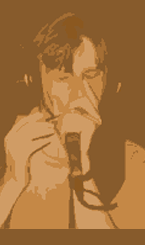|
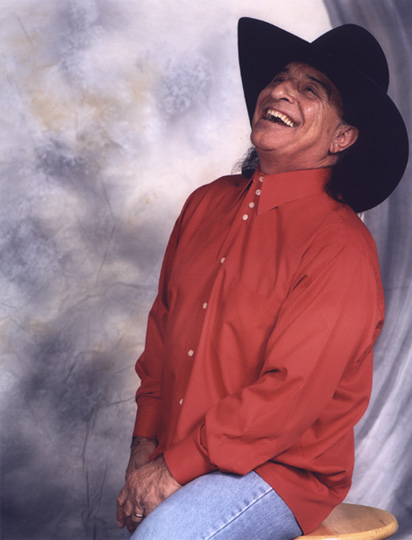
William Joel "Taz" DiGregorio (1944-2011)
©2007 By Bronson Herrmuth
So sad to have to type that Taz tragically passed away in a car accident on Wednesday, October 12, 2011, at the age of 67. RIP brother, your music and your memory will live forever. My Tribute to Taz
You can listen to this entire interview: Part 1 of 5 (6 MB) mp3 file
Bronson: I play fiddle, I guess I've probably played "Devil Went Down To Georgia", I bet literally, 2000 times man. How many times do you think you've played it?
Taz: Since 1979. You know what? I really don't know. We used to do about 300 days a year and now we're doing about 200 days a year so I don't know. 5 or 6,000 times, I have no idea. I never thought about it.
Bronson: Song of the Year.
Taz:It was one of the songs of the Century which was like 200 or 300 songs, and it was right in there with "Take Me Out To The Ball Game" and "When Irish Eyes Are Smiling" (laughing).
Bronson: I was looking at CMT and it's still one of the top 100 ever, right now, currently in 2007.
Taz: It keeps coming back. It was in The Waterboy with Adam Sandler and then it was in Coyote Ugly, they did a compilation album from the movie and that sold 3 million copies, it comes back, every 5 years it just comes back. It's like a living entity in some places (laughing).
Bronson: I think it was one of the biggest parts ever, obviously the first time in The Urban Cowboy and the whole movement. The whole Southern Rock world, a whole legitimacy. I remember watching you all at the awards when you played it.
Taz: Well you know the Urban Cowboy was probably the biggest and best thing that ever happened to the Charlie Daniels Band. I mean "Devil Went Down To Georgia" was doing okay but when the movie came out, even though the movie wasn't a block buster, it took this song all over the world and all of the sudden man it was like, whatever it was on the charts in England, and in France, and in Germany, and if you really listen to it and know a little about music history, it almost sounds like it was written by some guy in Ireland. It's a folk thing. It's a folk tale with a folk type fiddle, which is an Irish fiddle, so it makes it have a world wide appeal to it.
Bronson: But that's just one of many songs you've written.
Taz: I was a cowriter on "Devil Went Down To Georgia". Charlie wrote those lyrics and he had them for a lot of years from what I understand, then Tommy (Crain) and I had the musical part of it. The funny part about that song is we had a song called "Redneck Fiddlin' Man" and in the middle of it, back in the old days when we used to stretch, you know we'd stretch the arrangements night after night. Pretty soon you had a 6 minute song that ends up being like 20 minutes because you keep stretching the parts. So I had a part in the middle of this "Redneck Fiddlin' Man" where I was playing, "Devil Went Down To Georgia". I mean I was playing almost the whole song except for the major part of it, and we just took that part of it and it just worked. The brilliant part of Charlie Daniels is that we had the ability to give him the ideas he needed, to finish what we needed. He basically took pieces of what we did and just stuck it together. Let's do that and do that, and Bam, it was done in about an hour. (laughing) It was very fast.
Bronson: How many songs have you written?
Taz: I don't even know. Bronson I don't even count 'em, I'm still writing.
Bronson: How many songs you have out there that you've co-written?
Taz: I don't know, I'm going to say 50-100. I don't know and then I've got both my albums. You know on my stuff too, I write with a guy who's from Owasso, Oklahoma. He was actually from Brooklyn N.Y., he's an x Marine. He works for American Airlines, he's a mechanic, but we have been writing songs together for 25 years and if you think my name is hard, his name is Greg Wohlgemuth. So we've got DiGregorio and Wohlgemuth (laughing).
Bronson: I saw that on the credits and I was going to say Woglemuth.
Taz: (laughing) Yeah. But it's a magic thing. One of the few people I've ever been fortunate enough to find to write with where you just get in a room and it just goes Boom! I mean it happens so fast, you don't even know why it happens, it just happens and you don't even question what it is. It's just a magic thing.
Bronson: You're self taught as a musician? You're not trained, you didn't go to Julliard?
Taz: No I learned how to play music because I was a juvenile delinquent (laughing).
Bronson: And you could get girls right (laughing)?
Taz: Okay Bronson, let's tell the truth here. Anybody that gets into music and guys will tell you all kinds of stories, but the bottom line is if they got into music when they were younger, it's because the guys playing the instruments , especially the guitars, man they got all the girls. We'd say, "How do you do that you guys?" (laughing) So you pick up an instrument. Well my fingers are too fat to play guitar for some reason, I tried, but keyboards seemed to be real easy and just come naturally. When I was about 16, one day I just sat down and played and sang "Blue Monday". My sister said, "What are you doing? How did you do that?" I mean just like it, perfect, I said, "I don't know." She says, "You better do it again, you've got something right there." (laughing) But I listened to a lot of Ray Charles, B.B King. When I was 14 and 15 years old, I had every record Ray Charles made. I had B.B. King, John Lee Hooker, who was probably the most influential blues player I think, because his style went back to the 1800's actually. You know, I listened to what everybody else wasn't listening to. All the other kids were listening to Frankie Avalon and all that stuff (laughing) and I'm listening to Ray Charles.
Bronson: Well you're from Massachusetts right?
Taz: Originally, I'm from Southbridge. Yeah.
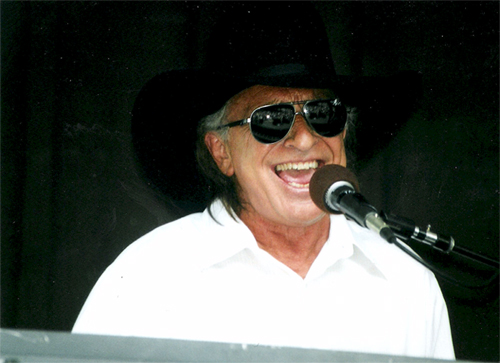
Download Part 2 of 5 (5.7 MB) mp3 file
Bronson: All these years man. Now how many years have you played with Charlie Daniels?
Taz: 36 years, this time.
Bronson: Because you were with him in a former group.
Taz: Right. I was with him in a band called The Jaguars back in the 60's. I was in the last set of The Jaguars, and then funny, he came to Nashville, went to work for Bob Johnson. He did session work and stuff and was writing and had some success with that I think, and I got drafted! I went in the Army and 2 years later I got out, he had become real serious about putting a band together and trying to make it. I saw him, I came down to Nashville and I'll never forget, I came to Nashville and he was in the studio with Leonard Cohen. I didn't even know who Leonard Cohen was. I had just got out of the Army and the whole world had changed. I hadn't been in the United States in 18 months and everything had changed. Everybody had long hair and they were acting strange.
Bronson: While I was researching you and in thing I noticed during that Vietnam era, your bands. Everybody kept getting drafted! That happened to The Jaguars right?
Taz: Before The Jaguars, I was in a band in Orlando, Florida, that's how I met Charlie, and the sax player got drafted but then he joined the Air Force, but then he got married to a woman who had 4 kids, so he got it double (laughing). He got 4 kids and he was in the Air Force, then so we hired a guitar player and he got drafted.
Bronson: (laughing) I saw that, it was just one after another after another.
Taz: Yeah, so I was sitting in Orange Blossom Trailer, the Palamino Motel with this girl that was like 10 years older then I was and was having some pretty serious medical problems. You know, we were hungry. The woman that ran the motel would feed us, she'd give us some grits and moonshine once in an while (laughing) and we'd survive. But then Charlie came in and I worked for Charlie.
The funny part about it, I remember Charlie inviting me to his motel room. Him and his wife had just gotten married, they'd been married 6 months. They have been married for 40 some years, that's a long time ago. He cooked some spaghetti for me, cooked the sauce himself, gave me a half a pint of whiskey and we drank it down, and then the next day we went and had lunch and he said to me, "If you will cut that hair and that beard off, I'll give you a job." (laughing) And I immediately did it.
Bronson: Yeah! (laughing)
Taz: I immediately did it, but I tell you what. He is a blessing to anybody that has ever worked or even been associated with him. I have never missed a pay check in 34 years. There was 2 years where there wasn't a whole lot and it didn't make any difference because we were trying to get a niche, trying to find a niche, but I have not missed a paycheck in 34 years. I've been on 45 records. I've been fortunate enough to be able to co-write with this man and give him ideas, and I've been fortunate enough to start my own publishing company and I've had a song on a lot of different records, my own songs, stuff that I write and that I sing and the whole thing, and you don't find any artists that have that big a heart, that they would actually let someone, and it's the Charlie Daniels Band and it's always been that. When we won the Grammy, it was the Charlie Daniels Band and it still is, even though the media and the music industry itself, they don't like that "band" part. They only want one guy to focus on because it's easier, but he still fights for that and to this day I have the utmost respect for the man. I mean always tell him, I'd walk the last mile for you and he'd walk the last mile for me.
Bronson: Talking about that last mile brother. You and Charlie and the Charlie Daniels Band. The war in Iraq, the war in Afghanistan.
Taz: We went over twice. I can't speak for everybody in the band, I can speak for myself and I think Charlie too, as far as what we feel about it. You know you've got men and woman who've signed up, they've joined up, they know what the wars about. They know exactly what's going on over there, they know what's going on. The only way we have to say thank you for fighting for America, is to go over and entertain these guys, so we went. We've done 20 days in Iraq.
Bronson: Had to wear the flak jackets and the whole bit right. Helicopters?
Taz: Yeah we do the whole thing, and we also while we're there, they sit up a table every night after we finish, usually so the 6 of us can sit, and we sign and shake hands with every person that's been at the concert. The first night I think this last time was about 1,600, then 2,400 and then it got to be 3,000 but we stayed. I don't care if it's 3 hours, 4 hours, but we make sure that each one of them gets a picture and each one of us sign it and we shake their hand and say thank you for the service.
Bronson: That's incredible that you guys do that. I know as a veteran myself how much that means.
Taz: It's a morale booster. The Generals and the Officers in charge will tell you that the moral after that is up for like months. As a matter of fact there's a place in Iraq that we played, where they had just lost a couple of soldiers like that week, and just us going in there kinda brought that moral back up.
Bronson: Well it gave them something to think about and brought them to home, and of course they also got to hear the Charlie Daniels Band.
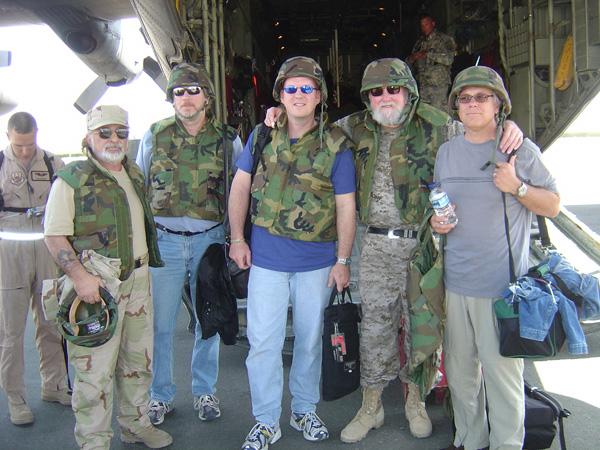
Download Part 3 of 5 (5.2 MB) mp3 file
Bronson: Two years ago I believe was the time I heard you all play? You played the 4th of July down in the park?
Taz: Right, with the Symphony. Yeah that was good.
Bronson: That was incredible man.
Taz: But you know, I'll tell this. The last thing I'm going to say about the Iraqi war. I turned on the TV in the last week or so and there's Harry Reid, telling the American public the war is lost. You think to yourself, how can you do this? These people are putting their lives on the line, I mean how do you think these people feel? Here's the bad part, they know it. They know Harry Reid, they know Ted Kennedy. You can't say certain peoples names over there.
Bronson: The thing is you've been over there. Did any of them have any doubt about us winning?
Taz: No sir. These people are there to do a job and if the political machine in America will let them do their job, they get it done. But that's what holding us back. You have folks like Harry Reid saying the war is lost.
Bronson: Giving the enemy inspiration.
Taz: You know the thing is they do so much good over there, their rebuilding the infrastructure. They're trying to bring democracy to a country that has never had any democracy, where women were like underlings, they weren't anything. They're doing a really really good job and the media doesn't really show the good things they do, they don't do that.
Bronson: It's sensationalism.
Taz: They only show the bad things. How can I make me a good paycheck.
Bronson: You've made 2 albums in the last 3 years is it?
Taz: Well the first one I did, Midnight in Savannah, that was about almost 2000, and then this last one took me about 3 years to do. It just was a long thing. It took me a year and a half to get the cover done, only because the man that did the cover is the President of the American Artists Guild, Guy Gilchrist. Great guy man, I love Guy, but he's busy, and so we fooled around and fooled around and we finally got it together. The funny thing about the cover is, the back cover was an ink drawing that he had and he was going to throw it away! (laughing) He said, "I don't know if you like this." and I went, "Guy, I've go to have this." So being that he's a cartoonist by trade, he has Lu Lu and all kinds of cartoons that he runs in the newspapers, he brought what he had drawn to a computer graphic artist and he smoothed it all out and made it look real good, 'cause he said, "If I put the color in it it's going to be Mickey Mouse, it's going to be cartoon." So he let this other guy do it. Yeah it took 3 years to do that one. Thought it would never end (laughing).
Bronson: Well you explore a lot of different musical stylings on those records and you've got some great players.
Taz: Yeah, Michael Rhodes, Jack Pearson, Mike Lawler, Tommy Crain, Bobby McCullough, who is an opera singer. The caliber of players were really, really, really good and everybody gave a lot, they really did. I'll say this for the musicians in Nashville. The new writers or even the old writers, if you need some help, these guys, like Michael Rhodes and Jack Pearson, they will come and play for you and they don't want an arm and leg and they do it because they love the songs, but they love what they do, the art you know, and I really appreciate everybody that's helped me on both records.
Bronson: You have 200 dates coming up with Charlie? You've got the Volunteer Jam?
Taz: Yeah, we're doing the Volunteer Jam. You know the thing is Bronson, I don't think it's 200 exact days. What it is, when you count up the time on the road and leaving and coming, it's about 180 days is what it is. Right now we're doing the Volunteer Jam, there's 24 of them. We've done Vacaville, Oklahoma, we did Oklahoma City, we did Spartanburg, South Carolina, we did one other one up there and then we're going to Tampa this weekend. It is the Outlaws who open, then the Marshall Tucker Band and then we come on, and then at the end, there's at least 8 million guitar players (laughing). Everybody comes back on stage, we do "South's Gonna Do It Again", 3 drummers, 4 drummers on the show, the Outlaws have 2 so they stack this stuff and we all play. He points and you do a solo and it ends the night that way.
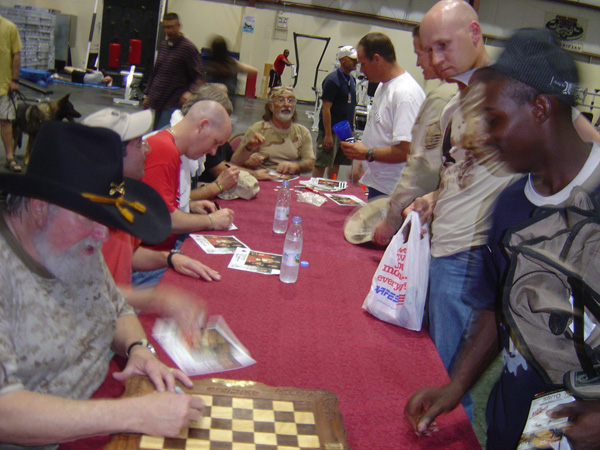
Download Part 4 of 5 (5.8 MB) mp3 file
Bronson: The southern rock movement. When I think of the southern rock movement man, there's 3 bands automatically if I had to say who are the top 3, and it's the the Charlie Daniels Band, the Marshall Tucker Band, and the Lynyrd Skynyrd band, and of course the Allman Brothers Band, not to disrespect them at all and I should have said top 4.
Taz: There was 8 bands. Now there's an encyclopedia that was put out by the University of North Carolina and it has a whole section on southern rock, and when you look at that section there's only 8 bands. There was the Allman Brothers which were the grandaddy of them all. The Allman Brothers, there was the Lynyrd Skynyrd Band, the Marshall Tucker Band, the Charlie Daniels Band, Wet Willie, the Outlaws, Grinderswitch and the Atlanta Rhythm Section were the bands. Those are the guys that made, I mean there were more bands then that but those are the bands that really made a dent. There was other bands, like they say well Molly Hatchet. Well Molly Hatchet was like second generation. There was Black Oak Arkansas, they never quite fit in, they were kinda too rock and roll for the southern rock (laughing).
Bronson: Well they had Jim Dandy.
Taz: It was like you know, but that was the 8 bands. We did a lot of tours with them back then.
Bronson: I did a couple of shows with Jim Dandy too.
Taz: Funny thing about Jim Dandy, he used to always wear white.
Bronson: Leather.
Taz: And he always had some chewing tobacco in his mouth and he'd be singing and you'd see it come down on his white tunic thing here man, this little brown stuff, so he had to quit. Management said, "Stop chewing on stage".
Bronson: I think that's why he played that wash board man, was to cover that. (laughing)
Taz: Yeah exactly, to cover that up.
Bronson: Commander Cody and his Lost Planet Airmen, you did shows with them?
Taz: We did shows with them. We played a place Bronson, in Roslyn Long Island. It was called My Fathers Place, and it was a circuit that all the rock bands, before we had categories, before when we just played music. (laughing)
Bronson: Before mp3.com?
Taz: Right, we played music. So we would play this circuit, like all the other bands, Commander Cody ...
Bronson: How 'bout New Riders of the Purple Sage?
Taz: New Riders of the Purple Sage, I'm trying to think ...
Bronson: Did you ever work with Mason Profitt?
Taz: Mason Profitt, yeah we played with Professor Theodore, the Holy Modal Rounders.
Bronson: (laughing) That's a new one on me.
Taz: It goes on and on. But we played a lot of shows with these guys, not with them actually, but in the same place. Like we would play one night and then the New Riders would come in and play the next night, but we all played the same places. The best shows I think, the ones I really enjoyed and I thought people really got their moneys worth was when we toured with War, Savoy Brown, and the Charlie Daniels Band. War was like a militant ghetto band, and Savoy Brown was like a English rock band, and we were, I don't know what the hell we were, but it was such a nice thing because the audience got to see a lot of different music. Now days they don't do that anymore because you can't have that much diversity on a show. I'm not sure where that came from.
Bronson: I'm not either.
Taz: You know what I'm saying'? Even on country shows, I think even now country shows oughta have new, old, and in between, to give people their moneys worth.
Bronson: I don't believe that the southern rock movement has gotten enough play yet. I'm sure it will as far what that meant to American music and it's exposure all over the world.
Taz: Well you know what? In France right now, as we speak. This is very strange, it's great I think. In France and in Germany and in a lot of Europe, southern rock is so big, they have festivals like 30 and 40,000 people that come to hear southern rock. Dicky Betts goes over there, we haven't gone over to do any of these things, but there's a whole European market with guys that look like they're from Mississippi and Georgia (laughing) and they speak French and German and they play southern rock music, and it's very very big. I ship to France all the time because they love it over there.
Bronson: If someone wanted to buy your new records, the 2 new records you have, where would they go?
Taz: Well you can go to www.charliedaniels.com and you go into the record section where you see the records that are sold on that site, and you can buy Shake Rag, or you can by Midnight in Savannah, the other one. Or you can write me at Taz DiGregorio, PO Box 38, Burns, Tennessee, 37209.
Bronson: Awesome, that's fantastic.
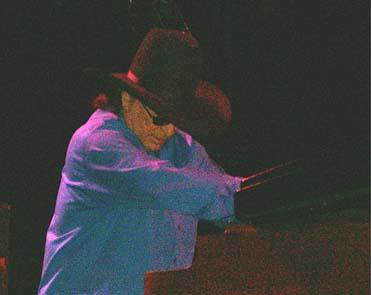
Download Part 5 of 5 (4.8 MB) mp3 file
Bronson: So I've got to ask you man. Do you think it's important that artists and songwriters need to be in Nashville, LA, New York? Do you think they need to relocate or do you think in this day and age a person can stay at the house and have success?
Taz: Well you know what? Now days Bronson, if you're going to do sessions you can send files and people would do it, but as far as writers I think you've got to go wherever the action is but you better be tough because it's a heart breaking industry. I man they'll take your heart and rip it out of your chest if you allow them to do that. I think the best thing for a young writer, or a singer, a musician, is to go for the writing end of it and write songs because that's who they remember. I mean you can be the greatest musician in the world, they're not going to remember you. Most of the time they'll remember whoever wrote the song and the thing is if you write 5 songs and you know one of them's a hit record, write 50. In other words, if something's going to happen you've got to be ready for it, mentally and also when you're writing. So in other words if you come to Nashville with 10 songs and you've got 1 hit record, that ain't going to do it because after that hit records over, what do you do then? So you have to stockpile. I've got 2 albums and a 3rd one on the way. The Charlie Daniels Bands' working on 46 and 47, I think we've got 48 coming out, "Live From Baghdad" and we also have a movie, called Volunteer Jam, and it was shot 33 years ago, so I get to see myself as a mere child (laughing).
Bronson: We were talkin', not long ago we both played up in Kentucky at the Bourbon Festival. They had all this free bourbon and both of us were going, if they'd have done this 30 years ago, they'd be hurting on this free bourbon (laughing).
Taz: Oh yeah, tell me about it. But I think for young people coming into the business, first of all, know the business. Make sure your publishing is together, make sure your copyrights are together, make sure you know exactly what you want, when you want to do it. You have to plan for yourself. Don't wait for some guy on Music Row to discover you, it ain't going to happen. You have to do most of the work yourself, then they come in after you've done all the work and say, "Look what I've found." (laughing)
Bronson: You've been on the road for so many years. Give me the secret to be able to be the consummate good band member if you had to say just a couple things?
Taz: Focus, you've got to focus man. I always tell young people when they ask me about the road, it's like being in the priesthood except you can have a lot more fun. (laughing) But you have to be that dedicated to what it is. The Charlie Daniels Band doesn't have bad shows, we have good shows and we have really good shows, but we don't have bad. Every night has to be perfect. When you're younger, well you're going to rock and roll but the older you get the more you need to focus on what you're doing because it gets harder the older you get, especially with the timing. Make sure you rest a lot, make sure you get enough rest. Make sure you eat, take a lot of vitamins, do some exercise and keep focused on what you do. Don't ever take your eyes off whatever the goal is. Always keep that right here, in your forehead so you know where you're going. Never take your eyes off it.
Bronson: I'm looking forward to hearing that 47th, 48th, Charlie Daniels record. I'm looking forward to hearing your next record. I hope I get to one of your shows and see you all kick. Your hat is a signature right? We used to look for it. "Has he got the hat on, on the record?" (laughing) Your records would come out, "Has he got the hat on?" At that Bourbon Festival, you were telling me that people were bringing up album covers for you to sign and you were looking at pictures of yourself 25, 30 years ago and not remembering where you took the shot. (laughing) I appreciate you sitting with me man.
Taz: Yes sir, well thank you Bronson. It's been a pleasure. I enjoy coming here and getting my records done up there with Johnny (Drake) and Dan (Griffen).
Bronson: We thank Al Jolson for the use of his studio. We thank Dave Judy for running the board. I'm closing out from Nashville with Taz DiGregorio. I love you man.
Taz: Alright, I love you too Bronson. Alright Buddy.
My Tribute to Taz
Top of Page
Back to My Interviews

|
